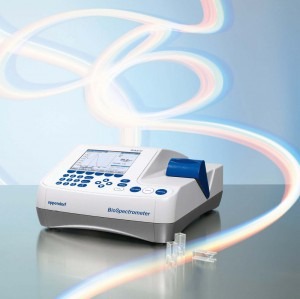
The new Biospectrometer from Eppendorf is designed for a range of routine and complex applications in genomics, proteomics, cell biology and biochemistry.
The new instrument, which is said to offer high sensitivity and guided operation, is available in two versions: the Biospectrometer Basic and the Biospectrometer Kinetic, which features a temperature-controlled cuvette holder.
Dr Tanja Musiol, global product manager of detection at Eppendorf, said: 'The Biospectrometer offers a wide variety of procedures for the most diverse methods in molecular biology, cell biology and biochemistry.
'Spectra, as well as individual wavelength measurements, can be monitored in a spectral range of 200nm to 830nm.
'The software leads the user through the methods in a guided process, minimising the risk of making mistakes.
'The entire operating procedure is guided by a help box, which explains each step.
'Two different models - Basic and Kinetic - enable selection of the optimal instrument for the individual laboratory's needs,' she added.
No PC is necessary to operate the system and integrated data processing options enable basic data processing directly on the device.
Up to 1,000 results can be stored in the Biospectrometer.
Pre-programmed methods facilitate quick-start applications and prevent errors, while a USB port is provided for simple data transfer.
The Kinetic model, with its temperature-controlled cuvette shaft, does not require any additional accessories in order to study enzyme or substrate kinetics.
The temperature of the cuvette shaft can be freely selected between +20C and +42C in 0.1C increments.
The Eppendorf Biospectrometer is claimed to deliver accurate results in routine applications such as protein and nucleic acid quantification as well as in complex molecular biology processes.




